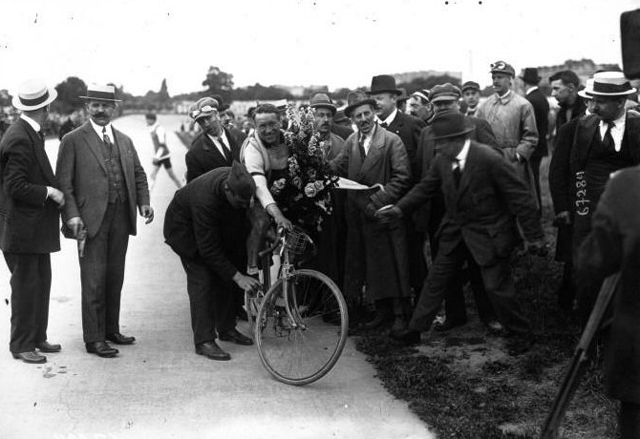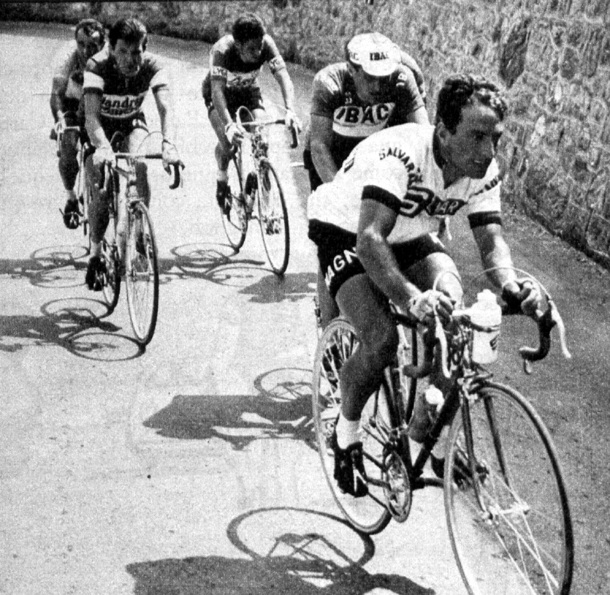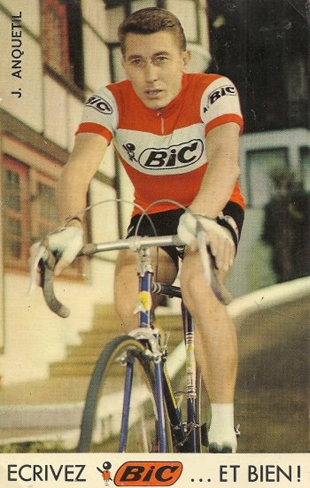

Cycling’s Twenty-One Greatest Climbers
BikeRaceInfo's Best Climbers: Riders 21–17

Les Woodland's book Paris-Roubaix: The Inside Story - All the bumps of cycling's cobbled classic is available as an audiobook here. For the print and Kindle eBook versions of the book, just click on the Amazon link on the right.
Riders are listed in reverse order. Rider number one will the rider in our judgement to be cycling's greatest-ever climber.
Cycling's Greatest Climbers intro | Climbers 16–11 | Climbers 10–6 | Climbers 5–1
21. Philippe Thys (1889–1971)

Philippe Thys after winning the 1913 Tour de France
Belgian rider Philippe Thys was one of cycling’s most accomplished riders. He was the first to win the Tour de France three times (1913, 1914, 1920), and this in an era when riders had to perform their own repairs. This rule had the effect of allowing minor equipment failures to regularly cause crippling time losses. Thys’ three Tour wins was not matched until decades later when Louison Bobet won in 1953, 1954 and 1955, and the rule requiring riders make their own bike repairs had been abandoned.
Thys wasn’t noted as a specialist climber, but in his prime he was a formidable ascender and on a good day could, at will, drop the crème of the peloton in the high mountains.
His results aren’t showy. As Les Woodland noted in his authoritative The Yellow Jersey Companion to the Tour de France, “He was an austere man who rarely wasted effort, and rarely acted on impulse.”
Thys’s major accomplishments:
- 1913: Tour de France General Classification and one stage win
Climbing: In stage six Thys was first over the Tourmalet, Aspin, Peyresourde and came into the finishing city of Luchon eighteen minutes ahead of second-place Marcel Buysse. This was the famous stage where Eugene Christophe had to repair his fork in a blacksmith shop.
- 1914: Tour de France General Classification and one stage win. Thys led the 1914 Tour from start to finish.
Climbing: In stage ten Thys, with Henri Pélissier alongside, was first over the Bayard. In stage eleven, Thys was first over the final rated climb, the Aravis.
- 1917: Giro di Lombardia (a formidably hilly race) and Paris–Tours
- 1918: Tours–Paris (not Paris–Tours, a different race)
- 1920: Tour de France General Classification and four stage wins
Climbing: Thys generally stayed with the leaders in the mountain stages. For instance, in the hilly seventh stage with the Ares, Portet d’Aspet, Port and Puymorens, Thys was first over only the Port, but finished with the lead group of four. In stage nine he was first over the last climb, the Castillon and won the stage by more than five minutes.
- 1922: Five stage wins in the Tour de France. Thys lost three hours in stage six because of a broken wheel.
Climbing: In stage nine Thys was first over the final ascent, the Castillon, and won the stage. He and second place Jean Alavoine crossed the line almost five minutes ahead of their nearest chaser.
- 1924: Two stage wins in the Tour de France
20. Vicente Trueba (1905–1986)
Owen Mulholland tells Vicente Trueba's story

Spaniard Trueba was the first winner of the Tour de France’s King of the Mountains competition in 1933. Nicknamed the Flea of Torrelavega (La Pulga de Torrelavega) for his small size by Tour Boss Henri Desgrange, Trueba barely weighed 100 pounds (45.5 kilograms).
Trueba’s weak spot was his descending. With no body mass and a left arm with badly damaged nerves, Trueba could be the first to a summit, but would be caught by less capable climbers on the descents. In Trueba’s day, there were no hill-top finishes, that was an innovation that came after the Second World War. As historian Owen Mulholland put it, “Trueba wasn't a ‘complete’ rider. Time trials, sprints, echelon riding; all were necessary evils for him”. That lack of a complete racing skill set meant winning stages and races were generally beyond him. Riding as a professional from 1925 to 1940, he won a total of six races.
It must be noted that Trueba’s best Tour de France performances came in 1933 and 1934 where he competed as a touriste-routier, an independent rider responsible for his own equipment, food, lodging, repairs. Trueba did this on his own, a signal accomplishment in the face of well-run national teams.
Trueba’s major accomplishments:
- 1933: Tour de France King of the Mountains and General Classification sixth place
Climbing: While Trueba won no Tour stages, he was first over the Ballon d’Alsace in stage four, led over the Galibier and Lautaret in stage seven, the Vars in stage nine, the Braus in stage eleven, Port in stage sixteen. In stage seventeen, finishing in Tarbes, he was first to crest the Peyresourde and Aspin and finished third as part of the lead trio with Jean Aerts and Giuseppe Martano. Trueba repeated the performance in stage eighteen where he led over the Tourmalet and Aubisque before finished seventh of the lead group of seven.
- 1934: second place Tour de France King of the Mountains and General Classification tenth place.
Climbung: In the 1934 Tour, Trueba ran into another one of cycling’s most gifted climbers, René Vietto, who won that year’s King of the Mountains competition with 111 points to Trueba’s 93. Vietto didn’t leave much for Trueba. Trueba led over only one pass that year when he was first over the Côte de Laffrey in stage eight.

Vicente Trueba monument in La Cavada (Cantabria), Spain
19. Vito Taccone (1940–2007)
 Vito Taccone in stage four of the 1969 Giro d'Italia
Vito Taccone in stage four of the 1969 Giro d'Italia
Vito Taccone (pro from 1961–1970) was one of the few successful professional racers of his era from southern Italy. Nicknamed the Chamois of Abruzzo for his spectacular climbing skills, the gifted rider won the prestigious Giro di Lombardia (now Il Lombardia) in 1960, his first year as a professional. But few riders have earned the dislike of fellow professionals as Taccone did. Accused of intentionally crashing other competitors, his 1964 Tour de France degraded into a fistfight with Fernando Manzaneque. He never rode the Tour again.
Still, his list of victories includes seven Giro d’Italia stage wins, two Giro King of the Mountains titles along with that Giro di Lombardia, a Giro del Piemonte, a Giro del Toscana and a Milano–Torino.
After retiring, in 2007 he was arrested for selling counterfeit and stolen clothing, a charge he denied until his death by heart attack in 2007 at 67.
Taccone’s major accomplishments:
- 1961: Giro d’Italia King of the Mountains and tenth stage; General Classification Tre Giorni del Sud; Giro del Lombardi
Climbing: In the Giro d’Italia Taccone was first over the Pozzano in stage ten (and won the stage), led over the Pietrastretta in stage eleven, stage fourteen’s Muraglione and the tough Abetone in stage fifteen. In stage nineteen’s Dolomite stage was first over the Pordoi, but did not finish with the lead group.
- 1962: Giro del Piemonte
Climbing: Though Taccone finished fourth in the Giro, he did nothing special in the mountains during that year’s Tour of Italy.
- 1963: two stage wins Giro di Sardegna; Giro d’Italia King of the Mountains, five stage wins; Giro di Toscana
Climbing: Taccone was on fire this Giro d’Italia. The first day of heavy climbing was the fourth stage and Taccone was first over the Rionero Sannatico and the Roccarao. In stage eleven he led over the Oropa and won the stage, three seconds ahead of Vittorio Adorni. Then in stage twelve he went over the Sempione first and then won the hill-top finish at Leukerblad. Taccone went over stage thirteen’s Gran San Bernardo first and won the stage.
Stage nineteen was a ferocious stage but a Taccone romp. He was first over the Duran, Staulanza, Cereda, Rolle, Valles and San Pellegrino before coming into Moena more than four minutes ahead of Enzo Moser and Franco Balmamion, his first chasers. This was riding at an extraordinary level.
- 1964: Giro della Campania; stage one of Tour de Romandie; fourth stage Giro d’Italia
Climbing: His Giro stage four win wasn’t the result of any monumental climb, but he was first over the Rolle in stage eight, though he got sixth in the stage. The only other pass he won was the Caruso early in stage twelve.

Taccone leads a break in the 1964 Giro d'Italia
- 1965: Milano-Torino, second Giro d’Italia stage nineteen
Climbing: The Caruso must have been a pass that agreed with Taccone, he was first over it in the third stage of the 1965 Giro d’Italia where it was the first categorized ascent of the day, though he faded after that. He wasn’t done that Giro, however. He led over stage nineteen’s Petit Saint-Bernard before Vittorio went on his famous attack on the Spluga to win the stage. Taccone was second that day at 3 minutes 33 seconds.
- 1966: Stage one of Giro d’Italia; Stage six Tour of Switzerland
18. Jacques Anquetil (1934–1987)
Jacques Anquetil photo gallery
 I know I’m going to get heat for including Anquetil. It was said that Jacques Anquetil was a rider that could drop no one but no rider could drop him. Anquetil, the first rider to win the Tour de France five times, was the supremely tactical and strategic rider who never wasted a single watt. He generally contained his competitors in the mountains and then crushed them with a devastating performance in the individual time trials. In his prime he was always able to stay close enough to the specialist climbers who posed a threat to the General Classification. Anquetil generally ignored riders who were unable to win the overall. Because of this careful shepherding of his resources, we really do not know how good Anquetil could have been in the mountains.
I know I’m going to get heat for including Anquetil. It was said that Jacques Anquetil was a rider that could drop no one but no rider could drop him. Anquetil, the first rider to win the Tour de France five times, was the supremely tactical and strategic rider who never wasted a single watt. He generally contained his competitors in the mountains and then crushed them with a devastating performance in the individual time trials. In his prime he was always able to stay close enough to the specialist climbers who posed a threat to the General Classification. Anquetil generally ignored riders who were unable to win the overall. Because of this careful shepherding of his resources, we really do not know how good Anquetil could have been in the mountains.
It was in the 1963 Tour de France that Anquetil showed how deep his talents really went. Hoping to help the mountain goats and keep Anquetil from suffocating the Tour with his dull tactical approach, the Tour organization reduced the time trialing from 129.5 kilometers in 1962 down to 79 for 1963. The finish lines for some stages were moved closer to the final summits as well. So how did Anquetil do? In stage ten with the Aubisque, Anquetil traded pedal strokes with one of cycling’s best ever climbers, Federico Bahamontes.
It was stage seventeen that was the real eye opener with its ascents of the Petit and Grand St. Bernard, the fearsome, unpaved Forclaz with a section of 25% gradient and the Montets. Anquetil joined Bahamontes and Raymond Poulidor after the Grand St. Bernard. Though Anquetil was riding a special lightweight climbing bike, one has to give Jacques credit for staying with Bahamontes as the Spaniard attacked and attacked Anquetil, shedding everyone (including Poulidor who, who is general credited with being a better climber than Anquetil) but Anquetil. Anquetil was able to win the stage and became the Tour leader. Though Anquetil would have been unable to accumulate the wins his did without being an outstanding climber, for this stage alone I believe Anquetil deserves to be on the list.
Anquetil’s major accomplishments:
- 1956: World Hour Record
- 1957: Tour de France General Classification with four stage wins; Paris–Nice General Classification
- 1958: Four Days of Dunkirk General Classification
- 1959 Tour de France third place; Giro d’Italia second place with two stage wins ; Four Days of Dunkirk General Classification
- 1960: Giro d’Italia General Classification with two stage wins
- 1961: Tour de France General Classification; second place Giro d’Italia; Paris–Nice General Classification
- 1962: Tour de France General Classification
- 1963: General Classification winner in: Tour de France, Vuelta a España, Dauphiné Libéré, Paris–Nice
- 1964: Tour de France General Classification; Giro d’Italia General Classification; Gent-Wevelgem
- 1965: Paris–Nice General Classification
- 1966: Liège–Bastogne–Liège; Bordeaux–Paris; third place Giro d’Italia; Dauphiné Libéré & Paris–Nice General Classification
- 1967: Third place Giro d’Italia
- 1969: Tour of the Basque Country General Classification
- Grand Prix des Nations: 1953, 1954, 1955, 1956, 1957, 1958, 1961, 1965, 1966
- Super Prestige Pernod International (season-long competition): 1961, 1963, 1965, 1966
17. Franco Bitossi (1940– )
Franco Bitossi interview | Franco Bitossi photo gallery

Franco Bitossi on his way to winning the 1967 Giro di Lombardia
Franco Bitossi was an extraordinarily versatile rider, being able to win the King of the Mountains and Points classifications in Grand Tours. He could climb like an angel, sprint well and was a competent time trialist.Complicating Bitossi’s career was a problem with attacks of tachycardia, which would cause him to stop and rest (sometimes in the middle of a race), until his racing heart calmed down. He was nicknamed Cuore Matto (Crazy Heart) because of his cardiac difficulties. Still he had a full and splendid professional career that went from 1961-1978.
Bitossi’s major accomplishments:
- 1964: Giro d’Italia King of the Mountains
Climbing: The 1964 Giro’s twentieth stage was a monumental 254-kilometer monster with the Madeleine, Vars, Izoard, Montgèvre and Sestriere ascents. Bitossi was first over the last three and came into the finish at Pinerolo alone, two minutes ahead of Vittorio Adorni. It was a fabulous ride.
- 1965: Tour of Switzerland General Classification; Giro d’Italia King of the Mountains, Championship of Zurich
Climbing: In the Giro’s ninth stage he was first over the day’s major climb, the Sant’Elia. The sixteenth stage finishing in Torino had the San Bartolomeo and Nava ascents and Bitossi led over both. Bitossi (finishing at the same time as Vito Taccone) won the twenty-firstst stage (finishing at the same time as Vito Taccone) after being the first over the Brescia Maddalena.
- 1966: Giro d’Italia King of the Mountains; Tour de France stages five & seventeen
Climbing: The Giro’s twentieth stage was stuffed with big climbs: Pordoi, Falzarego, Tre Croci, Cibiana and the Duran. Bitossi led over all but the Tre Croci, but finished 26 seconds behind stage winner Felice Gimondi.
- 1967: Tirreno Adriatico General Classification, Giro di Lombardia, Coppa Agostoni
- 1968: Tour de France Points and Combinations classifications, winning stage seven & sixteen; Championship of Zurich
Climbing: In the 1968 Tour Bitossi went after everything. In stage fourteen Bitossi had been the first to crest the Arès, but still finished just three minutes after Pingeon that day. Looking to win the General Classification, he ran out of gas on a long suicidal break in stage eighteen with Roger Pingeon. He fought a brutal battle for stage wins with Walter Godefroot and won the points classification. Going in to the final time trial he was in fourth place, just 58 seconds off the lead. Jan Janssen won that stage and the 1968 Tour de France. Bitossi was so tired from his fight with Godefroot for stage wins Bitossi lost more than four minutes, ending up eighth in the 1968 Tour.
- 1969: Giro d’Italia Points Classification; Coppa Agostoni
Climbing: The Giro’s stage eleven had the Roccaraso and Scanno ascents. Bitossi led over the Scanno and won the stage. Bitossi also won stage fourteen with its uphill finish in San Marino.
- 1970: Giro d’Italia Points Classification; Volta a Catalunya General Classification; Italian Road Championships; Giro di Lombardia
Climbing: The 1970 Giro’s nineteenth stage was short, just 120 kilometers, but it had the Falzarego, Tre Croci, Zovo and Croce Comelico ascents. Bitossi wasn’t first over any of them but he won the stage.
- 1971: Coppa Agostoni
- 1976: Italian Road Championships

Franco Bitossi winning the 1967 Italian Road Championships
Cycling's Greatest Climbers intro | Climbers 16–11 | Climbers 10–6 | Climbers 5-1
.







